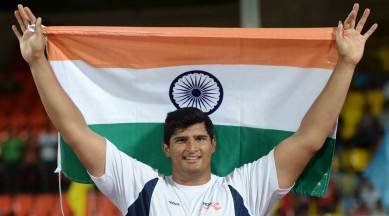Vikas Gowda quits discuss throw, turns attention to business studies
Vikas Gowda had spoken at length about his love for numbers when he was regularly teaching middle school children for up to 15 hours a week.

Last week, Shive Gowda asked his son Vikas what distance he was achieving during practice at the Olympic Training Centre in Phoenix. The 34-year-old discus thrower told his father that he was touching about 60 metres. An injury to his left knee had put paid to Vikas’s Commonwealth Games hopes. With the Asiad less than three months away, he had a lot of ground to cover.
Shive wondered aloud during the telephonic conversation if Vikas thought it was time to retire. The timing of the question, with the continental games around the corner, caught Vikas by surprise but he promised his father to sleep over it. On Tuesday, the two-time Commonwealth Games and Asian Games medallist decided to call it quits after a career spanning 15 years. He informed the Athletics Federation of India of his decision via email and will now turn his attention to earning a masters degree in business management.
monthly limit of free stories.
with an Express account.
“After a lot of thinking and consulting, I have decided to retire from athletics. I do not want to punish my body anymore and want to focus on the next phase of my life,” Gowda said. “It was an honour and privilege to represent India and I will miss it.”
Shive tells why he nudged his son into retirement. “There was no point in throwing 60-62 metres. Moreover, I felt it was time Vikas looked at life beyond athletics. He has won all the medals he possibly could,” Shive told The Indian Express from Washington DC. In a way, Vikas’s decision to retire is not a surprising one. His last major competition was the Asian Athletics Championships in Bhubaneshwar in July last here where he finished third with a throw of 60.81 metres. He was 28th at the Rio Olympics and managed just 58.99. His personal best of 66.28 metres came way back in 2012.
Vikas, though, is unlikely to spend a few days going down memory lane after making the big decision. He has already enrolled himself for a pre-qualifying course, which he needs to clear in order to be eligible to get admitted for the masters in business management.
“Vikas is a numbers man,” Shive says. In 2006, he had completed his masters in mathematics and statistics. Before the 2012 London Olympics, short on funds, Gowda became a mathematics tutor for children between the ages of 12 and 15. His love for numbers also saw him grow into a trusted aide for this father, a real estate businessman. “I always turn to Vikas for advice before making any investment. He calculates what my return on investment will be and I follow his advice,” Shive says.
“My elder son Vikram works for a hedge fund firm and Vikas has visited his office just to meet the people who work there. Vikas also invests in the stock market.”
Vikas had spoken at length about his love for numbers when he was regularly teaching middle school children for up to 15 hours a week. “I was always interested in math while growing up. When I went to college, I started out as a computer science major but eventually shifted to mathematics. In 2009, when I was injured and not competing, I began teaching at my high school. I mainly taught algebra to high school kids. When I moved to Phoenix, I did more of private tutoring because it could fit in with my hectic training schedule,” Vikas had said before the London Games. Gowda is a four-time Olympian and reached the final of the discus throw at the 2012 Games, where he finished 8th.
“Looking back, it has been a fascinating journey for our family. It feels surreal that Vikas has decided to retire but he knows it was time to quit athletics and pursue what he is equally passionate about,” Shive said. Shive, a former decathlete and an India national coach during the 1988 Seoul Olympics, moved to Frederick, Maryland, in 1989 when Vikas was six. The official apathy, lack of infrastructure and absence of professionalism in the 80s, things which Shive experienced first-hand, made him travel across the globe in a quest to make his sons Olympic medallists.